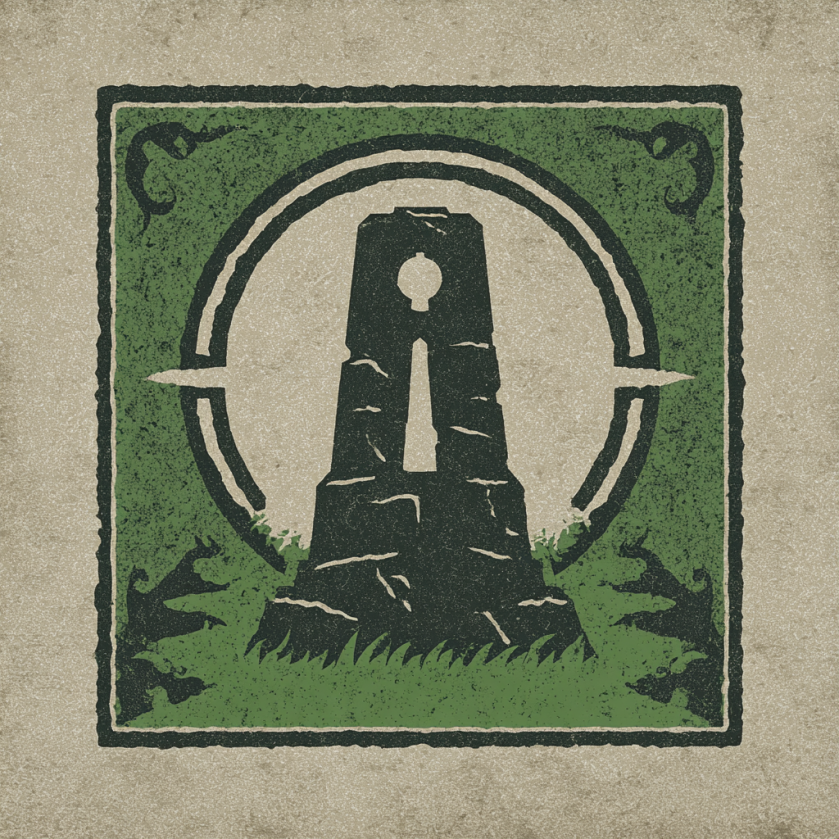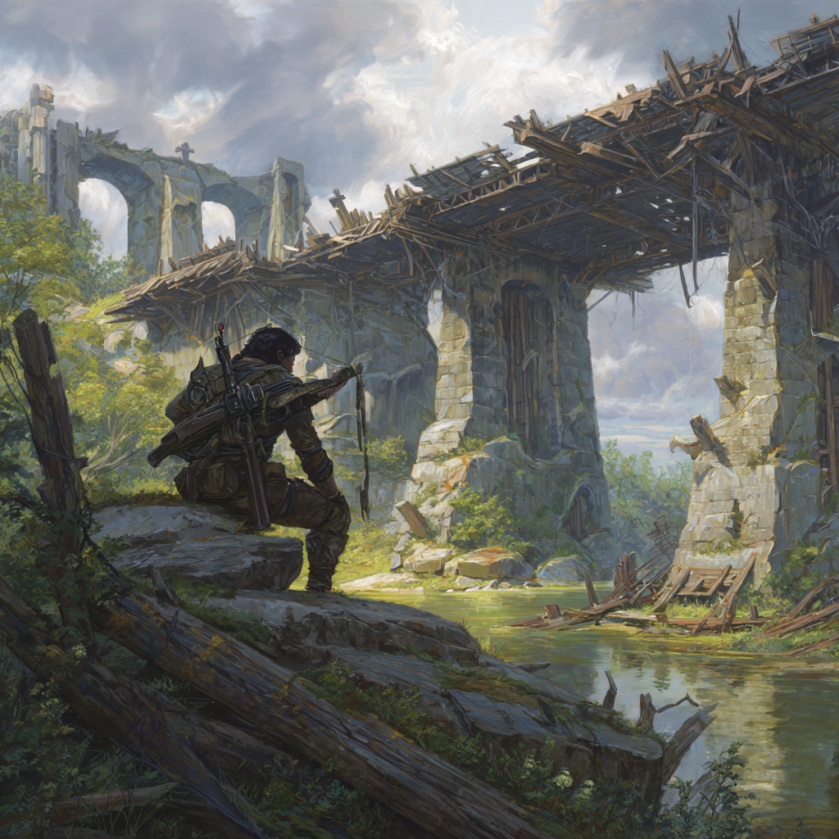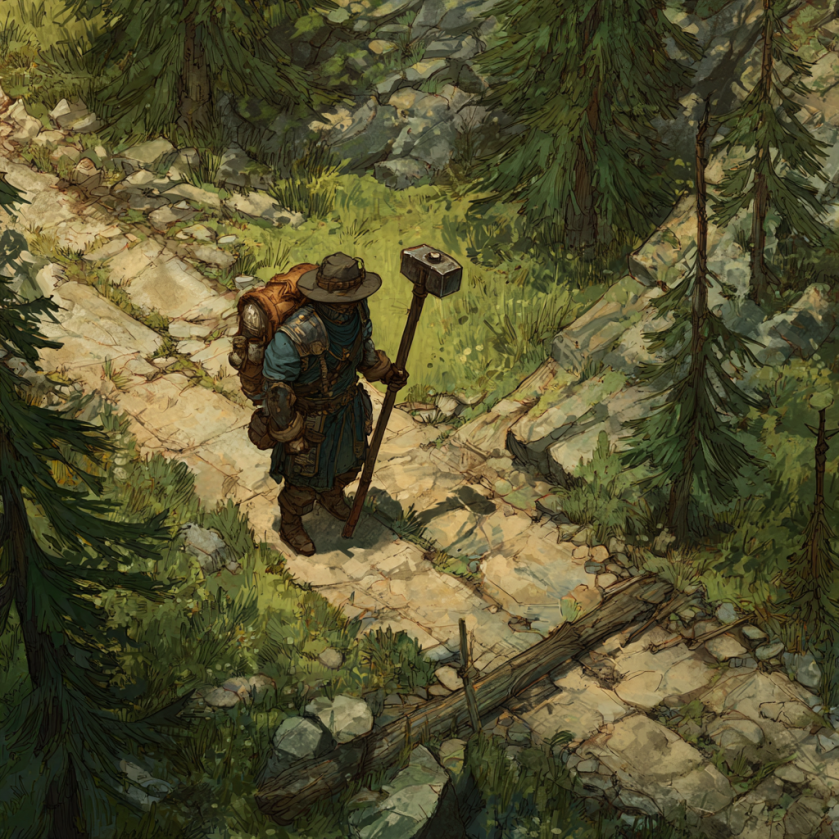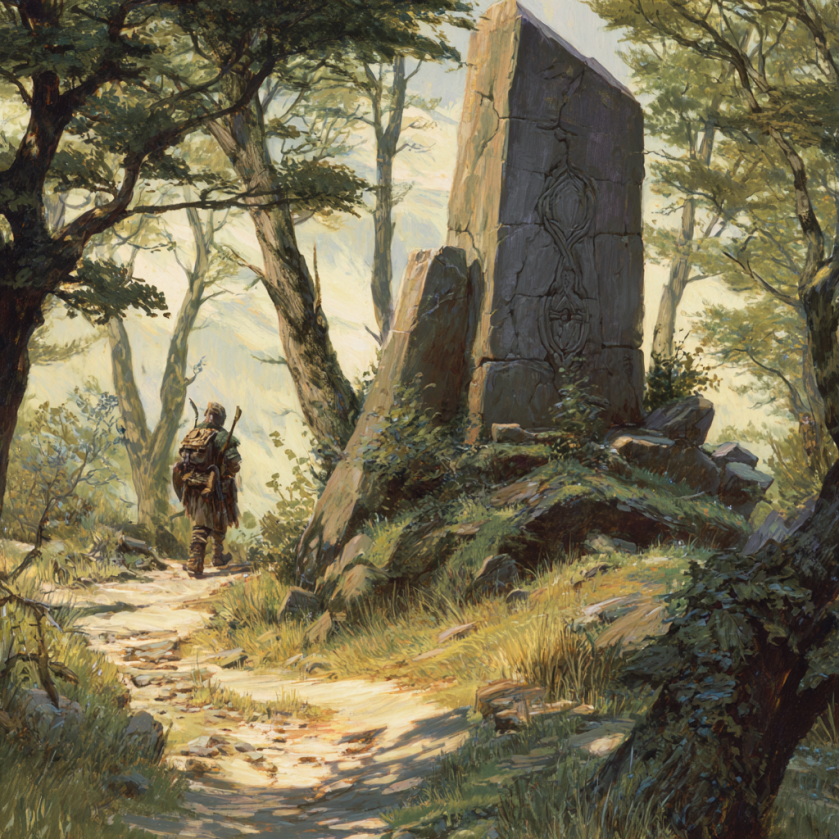The Road Wardens
"The road remembers every step."
— Ancient Road Warden saying
Mission and Reality
The Road Wardens maintain the Old King's Road network that connects The Crescent's major cities. Without their work, the region's economy would collapse within a single season as bridges fail, bandits multiply, and wardstones go dark.
The reality is less heroic than the mission. Wardens spend their days patching bridges with whatever materials they can scavenge, clearing rockslides with inadequate tools, and investigating problems they lack the resources to properly address.
Organization and Scale
The Numbers Problem
The Scale Crisis
About 2,000 miles of road maintained by about 250 active Wardens
Most work alone on patrol circuits covering about a day's march - far less coverage than needed for proper maintenance. It's not sustainable, and everyone knows it.
The organization functions through individual initiative rather than systematic coordination. Wardens make daily choices about which problems to address and which to postpone, knowing that postponement often means permanent neglect. Most spend their careers responding to failures rather than preventing them, and the work exhausts dedicated personnel within a few years, leaving critical routes in the hands of whoever can be recruited to replace them.
Wardens organize into small regional cells but typically conduct lonely individual patrols, staying overnight at waypoints along their routes.
Leadership Structure
Veteran Wardens carry most leadership responsibilities in an extremely decentralized structure. A High Command of senior Road Wardens provides loose coordination, but individual patrols operate with significant autonomy due to isolation and communication delays.
Monthly musters bring Wardens back to regional headquarters for resupply and coordination, though emergency calls often disrupt these schedules.
Recruitment and Personnel
Who Becomes a Warden
Nobody chooses the Road Wardens for glory or wealth. Most recruits are people with limited alternatives: discharged soldiers seeking steady work, exiled criminals looking for redemption, second sons with no inheritance, refugees from conflicts who need purpose.
The work attracts those comfortable with solitude who understand that civilization requires maintenance - unglamorous, constant effort that most people prefer to ignore.
Training and Equipment
New Wardens receive basic training in road maintenance, wardstone care, and emergency response. They learn to read stone pulses like a language - steady tones mean safety, irregular rhythms signal approaching problems.
Equipment is perpetually inadequate. Wardens make do with worn tools, patched gear, and supplies requisitioned from reluctant local authorities using ancient charter rights that create as many enemies as allies. Most carry only what they can manage alone on patrol.
A Warden's Kit
Road Hammer (warden's axe): Axe blade for cutting, flat surface for driving stakes and breaking rocks
Light Crossbow: For bandits and worse
Walking Staff: Support and secondary weapon
Repair Clay: Specially made magical clay used to patch wardstones
Personal equipment reflects the chronic scarcity that defines Warden life. Most gear is secondhand surplus or personally crafted, maintained through necessity rather than proper replacement cycles. Wardens learn to repair their own equipment because requisitioning new items through official channels takes months when it works at all.
Daily Operations
Maintenance Work
Road maintenance involves constant small repairs that prevent larger failures. Individual Wardens patch potholes, clear drainage channels, replace damaged road markers, and maintain rest stations along their patrol routes. They also check on settlements, isolated homesteads, and trading posts, often getting pulled into local problems that need an official authority figure.
Bridge maintenance requires specialized skills and expensive materials that solo Wardens can't handle. When major repairs are needed, multiple Wardens coordinate their efforts, though emergency patches using available resources are more common.
Wardstone Care
Wardstone maintenance remains the most mysterious aspect of Warden duties. The stones emit musical hums that experienced Wardens learn to interpret - changes in tone or rhythm indicate developing problems.
Emergency repairs use specially treated clay that temporarily restores function, though veteran Wardens admit they're "patching holes in a dam" rather than truly fixing the underlying issues.
Recent wardstone failures have increased in frequency and severity. The pattern is pretty consistent: wardstones develop a rhythmic pulsing "hum" before cracking or breaking, and pretty soon afterward, the road section begins to crumble away.
Security Duties
Road Wardens handle bandit problems, investigate attacks on travelers, and maintain security at major chokepoints along The Old King's Road. Their authority extends to requisitioning aid and supplies, though exercising these rights often creates local resentment.
Search and rescue operations for missing travelers consume significant resources, especially during harsh weather or when evidence suggests supernatural threats.
Practical Challenges
Resource Constraints
Cities want road maintenance but resist funding it adequately. Wardens operate under chronic shortages of materials, equipment, and personnel, forcing constant choices between competing priorities.
Ancient charters grant requisition rights, but local authorities interpret these narrowly and provide minimal assistance unless compelled by direct threats to their communities.
Growing Problems
Wardstone failures are accelerating, requiring emergency responses that stretch already limited resources. Some veteran Wardens report sections of road that appear different from day to day, though official reports dismiss these as measurement errors.
Increasing monster activity near failed wardstones suggests that the protective network is weakening, making Warden patrols more dangerous and less effective.
Relationships with Other Factions
Five Councils
The Five Councils officially oversee Road Warden operations but provide minimal funding or support. Council members recognize the importance of road maintenance while avoiding responsibility for adequate resource allocation.
The Concord
The Concord relies on road security for profitable operations but negotiates hard for protection services. Merchant houses complain about Warden effectiveness while resisting fee increases that would fund improvements.
Local Authorities
Settlement leaders have mixed relationships with Road Wardens - grateful for protection but resentful of requisition demands. Small communities often lack resources to provide meaningful assistance even when willing.
What Veterans Know
Unexplained Observations
Long-serving Wardens report disturbing patterns they can't officially document:
- Road sections appearing different between visits
- Wardstone pulse irregularities
- Damaged areas seeming intact on return trips despite no scheduled repairs
These observations remain unofficial, shared in whispers during monthly musters.
Long-serving Wardens develop understanding that goes beyond official training, but also learn when to keep quiet about it. Command dismisses unusual reports as patrol fatigue or measurement errors, so veterans share their concerns only with trusted colleagues rather than filing official documentation that disappears into administrative bureaucracy.
This unofficial knowledge creates two classes of Wardens - newcomers who follow procedures exactly, and veterans who understand that the procedures don't account for everything they encounter on patrol.
Practical Interactions
For Travelers
Road Wardens provide route information, emergency assistance, and security warnings. Experienced travelers know to report problems and offer small donations to Warden stations along their routes.
Individual Wardens can provide escort services for valuable cargo through their patrol sections, though they rarely abandon their routes except for genuine emergencies or significant payment.
For Communities
Settlements along major routes benefit from Warden protection but bear costs through requisitioned supplies and temporary billeting. Most communities maintain positive relationships through mutual necessity rather than enthusiasm.
Local militias sometimes coordinate with Warden teams during major threats, combining knowledge of local conditions with Warden experience handling road-related dangers.





